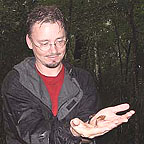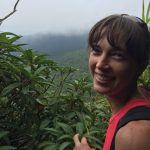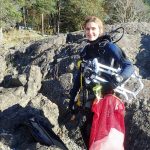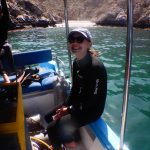Curatorial Staff
Curator of Marine Malacology
352-273-1948
paulay@flmnh.ufl.edu
 John Slapcinsky
John Slapcinsky
Collections Manager
352-273-1829
slapcin@flmnh.ufl.edu
 Amanda Bemis
Amanda Bemis
Collections Manager
352-273-1828
abemis@flmnh.ufl.edu
Mandy has been working in the Invertebrate Zoology division of the FLMNH since 2004. In addition to caring for the collection, she also dabbles in the taxonomy of phyllidiid sea slugs and has cultivated a recent interest in polyclad flatworms.
Volunteers and Collections Assistants
- Ann Dunn
- Soma Elefánti
- Lily Frierson
- Dan Hayman
- Emilio Pedroza Lopez
- Thaleia Roda
- Parker Schoenauer
- Gwendolyn Weagraff
- Bethene Wilkinson
Current Students
 Brittany Cummings
Brittany Cummings
Ph.D. Candidate, Zoology
I study small crustaceans called amphipods. My dissertation research focuses on particularly diverse amphipods called corophioids which exhibit many weird and wonderful body forms. Some corophioid species live in tubes or build sleeping bags from algae, and others suspension feed off sea urchin spines or spend their lives on whales. I am using next-generation sequencing to investigate how the evolution of silk glands may have ignited corophioid diversification. I am also using SCUBA surveys to improve eDNA detection of rare amphipod species and investigate purported mimicry in the colorful corophioid species complex Podocerus cristatus. My work will generate one of the first phylogenomic analyses of amphipods and provide the framework to unravel the evolutionary and ecological mysteries of these strange crustaceans.
 Abigail Uehling
Abigail Uehling
Ph.D. Candidate, Biology
I study sea star biogeography and evolution. My research is particularly focused on patterns of biogeography across the Arabian Peninsula, a region that has steep environmental gradients such as wide ranges in temperature, salinity and nutrient levels. I am trying to untangle how oceanic fronts, life history, and environment contribute to asteroid diversification across this region. I am also broadly interested in echinoderm evolution.
Jessica Whelpley
Ph.D. Candidate, Biology
 Dr. Gustav Paulay
Dr. Gustav Paulay